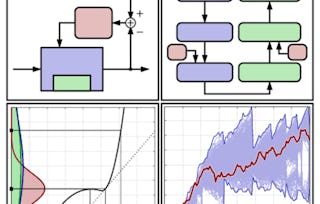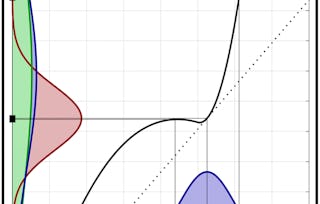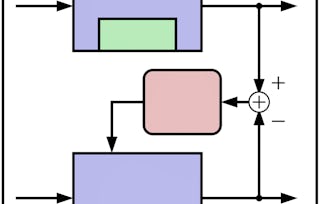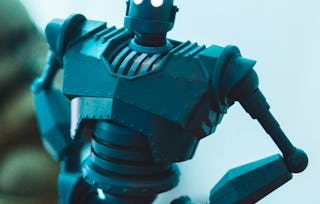As the final course in the Applied Kalman Filtering specialization, you will learn how to develop the particle filter for solving strongly nonlinear state-estimation problems. You will learn about the Monte-Carlo integration and the importance density. You will see how to derive the sequential importance sampling method to estimate the posterior probability density function of a system’s state. You will encounter the degeneracy problem for this method and learn how to solve it via resampling. You will learn how to implement a robust particle-filter in Octave code and will apply it to an indoor-navigation problem.

Particle Filters (and Navigation)

Particle Filters (and Navigation)
This course is part of Applied Kalman Filtering Specialization

Instructor: Gregory Plett
Included with
Recommended experience
Skills you'll gain
Details to know

Add to your LinkedIn profile
24 assignments
See how employees at top companies are mastering in-demand skills

Build your subject-matter expertise
- Learn new concepts from industry experts
- Gain a foundational understanding of a subject or tool
- Develop job-relevant skills with hands-on projects
- Earn a shareable career certificate

There are 4 modules in this course
This week, you will learn a computationally intensive method to estimate the state of highly nonlinear systems, where the pdfs do not need to be Gaussian.
What's included
7 videos12 readings5 assignments1 discussion prompt1 ungraded lab
This week, you will learn the tricks we will use to approximate the brute-force solution.
What's included
6 videos6 readings6 assignments4 ungraded labs
This week, you will put all of the tricks from week two together to implement (and then refine) the particle-filter method.
What's included
7 videos7 readings7 assignments4 ungraded labs
This week, you will learn how to apply the particle filter to an indoor navigation problem.
What's included
6 videos6 readings6 assignments1 ungraded lab
Earn a career certificate
Add this credential to your LinkedIn profile, resume, or CV. Share it on social media and in your performance review.
Instructor

Offered by
Explore more from Electrical Engineering
 Status: Free Trial
Status: Free TrialUniversity of Colorado System
 Status: Free Trial
Status: Free TrialUniversity of Colorado System
 Status: Free Trial
Status: Free TrialUniversity of Colorado System
Why people choose Coursera for their career

Felipe M.

Jennifer J.

Larry W.

Chaitanya A.

Open new doors with Coursera Plus
Unlimited access to 10,000+ world-class courses, hands-on projects, and job-ready certificate programs - all included in your subscription
Advance your career with an online degree
Earn a degree from world-class universities - 100% online
Join over 3,400 global companies that choose Coursera for Business
Upskill your employees to excel in the digital economy
Frequently asked questions
To access the course materials, assignments and to earn a Certificate, you will need to purchase the Certificate experience when you enroll in a course. You can try a Free Trial instead, or apply for Financial Aid. The course may offer 'Full Course, No Certificate' instead. This option lets you see all course materials, submit required assessments, and get a final grade. This also means that you will not be able to purchase a Certificate experience.
When you enroll in the course, you get access to all of the courses in the Specialization, and you earn a certificate when you complete the work. Your electronic Certificate will be added to your Accomplishments page - from there, you can print your Certificate or add it to your LinkedIn profile.
Yes. In select learning programs, you can apply for financial aid or a scholarship if you can’t afford the enrollment fee. If fin aid or scholarship is available for your learning program selection, you’ll find a link to apply on the description page.
More questions
Financial aid available,


